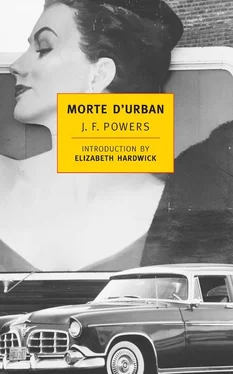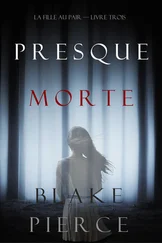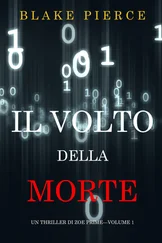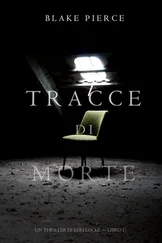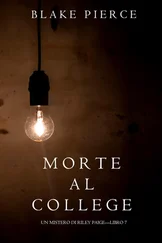“I really couldn’t say,” said Father Urban. He went over to the window and gazed out at the frozen lake.
Wilf came and stood beside him and, after a moment, said, “Think you’ll be happy here?”
After meditating several replies, Father Urban said, “I don’t know why not — do you?”
“No, there’s a lot to be done here. You may not think so, but there is.”
“What makes you say that?”
“Well, I know this isn’t what you’re used to. Maybe it’s a lot less than you expected. Maybe you didn’t expect much. I don’t know.”
Father Urban felt that Wilf was asking for his support — for more support than should be expected from a man who had been treated so shabbily. “What are those trees that keep their leaves?” he asked.
“That’s your red oak.”
Father Urban moved away from the window. “Have you had many overflow crowds?”
“Can’t say as we have, as yet.”
“Any?”
“No.”
They left the Rec Room, going out by another door. In the corridor, there were more signs: TOILET, TUB, UTILITY CLOSET, FR WILFRID.
“Where do you get your signs?”
“Brother Harold’s taking a course by mail. Show-card lettering.”
“Oh?”
“His ultimate goal is sacred art.”
“Oh.”
“I want retreatants to feel at home here, but I don’t want ’em barging in where they’ve no business. That’s just one of the problems here.”
“I’d say you’ve got that one pretty well licked.”
“My room,” Wilf said, throwing open the door. Wilf had an antique bed with a high carved headboard. “It was in the attic. Otherwise, I can assure you, I wouldn’t be sleeping in such a fancy bed.”
“Don’t tell me that’s a feather mattress.”
“Somebody who was here on retreat sent it to me. It belonged to his grandmother who had just passed away — in a hospital, he said.”
Wilf, who seemed a little nervous about his bed, went over to an old roll-top desk. “I do without a dresser, you see.” He opened and shut one of the drawers. He had his black socks in it. “No rug,” he said, pawing the floor. “But you’ll want to see your room.”
Father Urban’s bed was narrow and steel, monastic indeed compared with Wilf’s, but there were two throw rugs, a dresser with a spotty mirror, a floor lamp, a green rocker, and an easy chair upholstered in glistening red imitation leather. Wilf had only a couple of the green rockers in his room. Father Urban felt that Wilf had made an effort for him. But it did seem a bit chilly in the room to Father Urban, even though he was still wearing his overcoat. “Is the heat on in here?” he asked.
Wilf went over to the register. “Closed,” he said, and opened the shutters. “But maybe I’d better check to see that this isn’t one I’ve got turned off in the basement.”
“I wish you would,” said Father Urban. He laid his attaché case on the bed and, as he did so, pressed down on the mattress — actually, he preferred a firm mattress.
“This new chair really belongs in the Rec Room,” Wilf said, “but I don’t see why you shouldn’t have the use of it until such time as we need it there. Before too long, I hope to get more chairs of this type. Nice, isn’t it? I got a pretty good deal on these. Just the two at present, and I gave the other one to Father John.”
“How about the rugs? Are they here to stay?”
Wilf stiffened. “I don’t see why not,” he said.
They looked into the little room next door to Father Urban’s. It was empty except for a rocking chair and a smoking stand and had a stairway leading up to a trapdoor in the ceiling. “No heat or electricity in here,” Wilf said, “but when the weather warms up this could become your study, if you like.”
“Thanks, but I don’t think so,” said Father Urban.
“That could easily be changed,” Wilf said, referring to the sign on the door, a sign saying TO ATTIC.
“No, I don’t think so.”
“I’ll ask Father John then,” Wilf said. “Well, no need to show you the rooms on the north side of the house. They’re not being heated at present.”
So, going down by the front stairway, a rather grand old affair that had stood the years very well, they returned to the first floor. They were still wearing their overcoats, and Father Urban was none too warm in his. “You must save a lot on heat,” he said.
IN THE EVENING, they drove to town. No one was in attendance at the station, not even the dog. Father Urban strolled in, picked up his bag, and strolled out. What if he’d been a thief?
When the train came, Jack wasn’t on it. “He got a ride,” Wilf said. “We’ll go back to the house, and he’ll be there.” Jack wasn’t there, though. “He’ll be here any minute,” Wilf said and got ready for the powwow he’d mentioned earlier.
Father Urban looked through some issues of Life , while Brother Harold, at the long table, worked at his show-card lettering, and Wilf, after putting pencils and scratch pads around at the other table, stared out at the night, fooled with the radio, which had a bad hum, and rocked himself.
About nine o’clock, Wilf left the room, saying, “Have to call him, I guess. Maybe he’s taken ill.” When Wilf re-turned, however, it seemed that he’d only inquired about the long-distance rates. These he discussed at great length with Brother Harold. Whether to call station-to-station or person-to-person — that was the question. There was a difference of thirty cents, which wasn’t much, but why throw it away? Since Father Urban wasn’t asked for an opinion, he said nothing and read on. ( Life seemed to feel that money should be no object when it came to national defense.) In the end, Brother Harold more or less prevailed, and Wilf went off again. He returned, however, saying, “Good thing I didn’t call person-to-person. He answered the phone himself.” The pastor for whom Jack was filling in had been delayed, but Jack would be back on the following evening. “So I guess we’ll have to postpone it until then,” Wilf said, removing the pencils and scratch pads from the round table.
Father Urban wasn’t sorry about the postponement, and not only because he wasn’t anxious to see Jack. No, he had seen and heard enough of Wilf for one day.
Except for Brother Harold’s cooking — the fat young man had performed miracles with the big fish, serving it first baked, and then again, in the evening, as a chowder — the picture looked pretty dark at Duesterhaus. After lunch, they had visited the red-brick building. Minor, as Wilf called it, hadn’t been used because the number of retreatants in residence at one time had never exceeded the accommodations in Major — the old mansion. Major was being occupied by the staff because Minor could better stand to be left unheated in the winter. Major, left unheated, would go completely to pieces, Wilf said. This struck Father Urban as a typically Clementine arrangement, eating the stale bread because the fresh would keep. It hurt him to see Minor sitting there cold and empty, with its screens rusting away in the windows, bird nests in its gutters, with a layer of grit everywhere inside, and the toilet bowls dry, each with its rust-line. “Lots of iron in the water.” This didn’t explain why the bowls hadn’t been scoured, though. Everywhere it was the same story. The dock was buckled up in the lake, and the boat, an old flat-bottomed scow shaped like a coffin, was also in the grip of ice. “Winter snuck up on us.” Of the summerhouse, though the screens were gone in places as big as your hand, Wilf said: “Here’s the spot to read your office in the summertime, away from the mosquitoes.” Asked about the mosquitoes, whether they were very bad, he said: “It all depends.” There was a hole in the root-cellar door: “See what the gophers did.” A birdhouse and a long pole had parted company: “See what the wind did.” And when a black dog, the property of a neighboring farmer, came bounding up to Wilf, he thumped its head and said, “If this dog ever has pups, I mean to have one,” to which Father Urban dryly replied, “You may have to wait a long time,” for it was obviously a male dog. “Well, you know what I mean,” Wilf said — and coming from him just then, after all Father Urban had seen and heard, these were mighty reassuring words. They were standing on the front porch of the house, the tour having ended, when a flight of geese rowed by, high in the sky. “Canadian honkers!” Wilf cried. “Hello! Good-bye! See how they follow the leader!” And this, when Father Urban thought about it, as he did that night in bed, was the most disturbing thing Wilf had said all day.
Читать дальше
